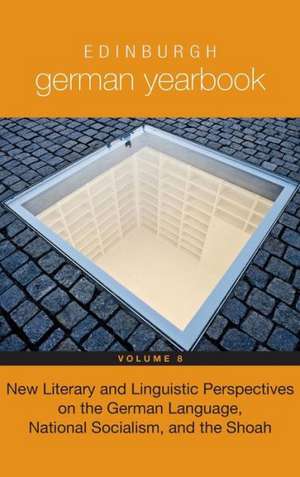Edinburgh German Yearbook 8 – New Literary and Linguistic Perspectives on the German Language, National Socialism, and the Shoah: Edinburgh German Yearbook
Autor Peter Davies, Andrea Hammelen Limba Engleză Hardback – 27 noi 2014
This collection provides new perspectives on the relationship - or the perceived relationship - between the German language in all its manifestations and the causes, nature, and legacy of National Socialism and the Shoah.
Contributors: Ian Biddle and Beate M ller, Mary Cosgrove, Peter Davies, Sylvia Degen, Andrea Hammel, Geraldine Horan, Teresa Ludden, Dora Osborne, Marko Pajevic, James Parsons, Simone Schroth, Arvi Sepp, Simon Ward, Jenny Watson.
Peter Davies is Professor of Modern German Studies at the University of Edinburgh. Andrea Hammel is Senior Lecturer in German at Aberystwyth University.
Preț: 647.70 lei
Preț vechi: 799.64 lei
-19% Nou
Puncte Express: 972
Preț estimativ în valută:
123.94€ • 129.73$ • 103.16£
123.94€ • 129.73$ • 103.16£
Carte tipărită la comandă
Livrare economică 31 martie-14 aprilie
Preluare comenzi: 021 569.72.76
Specificații
ISBN-13: 9781571135971
ISBN-10: 1571135979
Pagini: 256
Dimensiuni: 165 x 238 x 23 mm
Greutate: 0.55 kg
Editura: CAMDEN HOUSE
Seria Edinburgh German Yearbook
ISBN-10: 1571135979
Pagini: 256
Dimensiuni: 165 x 238 x 23 mm
Greutate: 0.55 kg
Editura: CAMDEN HOUSE
Seria Edinburgh German Yearbook
Notă biografică
Peter Davies, Andrea Hammel
Cuprins
Introduction: The German Language, National Socialism, and the Shoah German Language and National Socialism Today: Still a German "Sonderweg"? Clear Wording or "Historical" Euphemisms? Conceptual Controversies Surrounding the Naming of National Socialist Memorial Sites in Germany "Lieber, guter Onkel Hitler": A Linguistic Analysis of the Letter as a National Socialist Text-Type and a Re-evaluation of the "Sprache im/des Nationalsozialismus" Debate "German was heard so often in our Dutch home": German Nazi Refugees in the Netherlands and Their Ambivalent Relationship with Their Mother Tongue "Whose text is it anyway?" Influences on a Refugee Memoir Stigma and Performance: Victor Klemperer's Language-Critical Reflections on Anti-Semitic Hate Speech Reinventing Invented Tradition: Vergangenheitsbewältigung and the Literature of Melancholy "Even the word 'und' has to be re-invented somehow": Quoting the Language of the Perpetrators in Texts by Anne Duden "Reden ist Silber, Schweigen ist Gold": German as a Site of Fascist Nostalgia and Romanian as the Language of Dictatorship in the Work of Herta Müller The Power of Language and Silence: Reinhard Jirgl's Die Stille "Disrupted Language, Disrupted Culture": Hanns Eisler's Hollywooder Liederbuch (1942 43) "and all of a sudden, in the middle of it, they began singing . . .": Languages and Commemoration in Arnold Schoenberg's Cantata A Survivor from Warsaw (Op. 46) Understanding a Perpetrator in Translation: Presenting Rudolf Höß, Commandant of Auschwitz, to Readers of English Translating Testimony: Jakob Littner's Typescript and the Versions of Wolfgang Koeppen and Kurt Nathan Grübler







